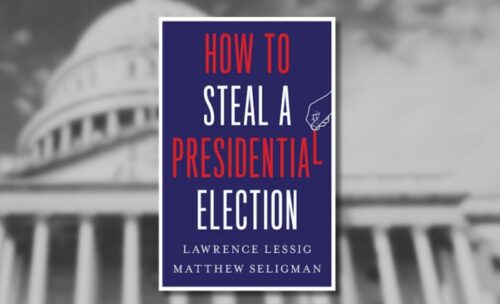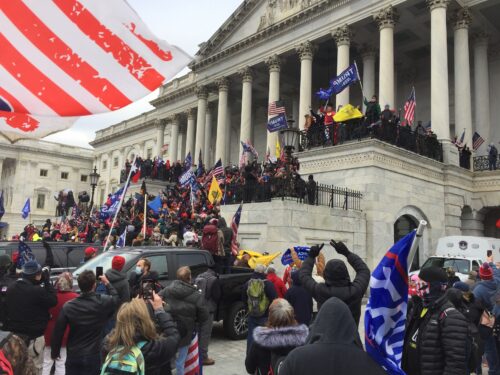
Video
Feature
At the Ash Center, Lawrence Lessig, Matthew Seligman, and Ian Bassin discuss the looming threats to our next presidential election.
Lawrence Lessig and Matthew Seligman, authors of How to Steal a Presidential Election, joined the Ash Center for a discussion about how to counter organized efforts to overturn presidential election results. Though the violent events of January 6th, 2021 continue to reverberate across the political spectrum, the pair warned that perfectly legal avenues still exist for overturning election results. Lessig and Seligman were joined in discussion by Ian Bassin, executive director of Protect Democracy, and a former White House counsel. Below are excerpts from their April 29th, 2024 talk at the Ash Center. We also invite you to watch the full event recording and learn more about Lessig and Seligman’s book.
“We consider the hypothetical of a state legislature, before election day, just declaring there won’t be an election day in their state or if there is, that it won’t decide the electors – they will themselves. The legislature will themselves pick the slate of electors. And I think most constitutionalists think that would actually be completely constitutional. But I think most non-lawyers look at that and say that’s just outrageous.
But the point to focus on is that in fact, at least 40 states, maybe as much as 42 states have effectively done that by deciding that all electoral votes will go to the plurality winner of the popular vote. Because what that means is in states that are not swing states, the campaign just doesn’t matter. We know today how at least 40 states will decide on election day. And so…this is an opportunity to begin to think, we hope much more deeply about what can we do to improve the democratic responsiveness of the system we have for electing the president.”
“The political movement that we’re seeing that would take advantage of these legal loopholes is fundamentally anti-democratic in some respects. And that doesn’t reflect the old school Republican party. It doesn’t reflect any particular policy position on taxes or trade or immigration or abortion. It’s an idea about a commitment to the democratic system or the absence of that commitment. And the best evidence that we have that there’s one political movement in the United States that lacks that commitment is what we saw happen in 2020. It isn’t the Republican party and it’s not conservatism. It’s the parts of the Republican party and the conservative movement that fundamentally rejects the democratic system and is willing, through conspiracy theories and legal manipulations, to undermine the legitimate results of elections.”
“You can look back at periods in American history in which, for example, in the Antebellum period through the Jim Crow period, it was the Democratic party that was fundamentally anti-democratic. And people forget that during those periods in history, the notion that bipartisanship was the order of the day was near to be found.”
“A really important issue that so much of what goes on in elections is not just a matter of the strategy and the manipulation, but also the nuts and bolts of compliance. Election administrators have incredibly difficult jobs and now they have a new law that they have to comply with. And they often need the legislature to step in and to update state laws to be in compliance with the new deadlines in the Electoral Account Reform Act.”
“I think it’s important to recognize we’re in a time of constitutional hardball, which is why this is such a hard question, I think in most times, and 2000 is a great example of that. At a certain point, people are going to accept the results, but we’re at a time, I think where both sides feel like the election is existential. Certainly Donald Trump thinks the election is existential for him, but even if party people believe the election is existential, they’ll make whatever move is necessary.”
“We can’t ever design a system that is completely impervious to bad faith. It’s not as if James Madison, if he had only lived long enough, he could have designed a system that perfectly balances everything like the perfectly designed clock. But we can narrow the window for bad faith actors to manipulate the system. And to give one example, there’s no reason, as Larry said, that the electors should be voting in the middle of December. That date should be moved back, and Congress can do that right now. I think that we think ‘oh, it’s an election year. How could there possibly be a law that passes Congress that in any way tinkers with the mechanics of the election system?’ But this is something that’s not just in the interests of Democrats. It’s in the interests of anybody who doesn’t want chaos, and one has to hope that that’s everyone.”
“One of the scariest statistics about January 6th, 2021 is that the number of people who believe the election was stolen on January 6th, 2021 is basically the same as the number of people, people who think it’s stolen today. That’s because we live in a media ecosystem that has become so good at channeling us into our own bubbles of reality. And the constant flow in each of these channels is reinforcing of views that are deeply contradictory to each other.”
“I think that we have to be sober minded about the fact that the people who would steal the election have had four years to prepare. We were somewhat saved by the fact that the effort at the end of 2020 and early 2021 was shambolic. It was like the keystone cops in a lot of ways, and they didn’t really understand the best ways to manipulate the system. The pieces weren’t quite in place. It was all done at the very, very last minute. But that’s changed. And the people who would want to take advantage of these legal loopholes have been working at it for four years.”
Video
Podcast
Archon Fung and Stephen Richer invite democracy and civil rights advocate Cornell William Brooks to assess the evolution of America’s historical narrative and what implications history has on our contemporary political context.
Podcast
Co-hosts Archon Fung and Stephen Richer weigh conflicting predictions for the 2026 midterms and explore how to safeguard a free and fair election.
Podcast
White House reporter Annie Linskey offers a closer look at how the Trump White House makes decisions and what recent actions reveal about its strategy.
Podcast
Archon Fung and Stephen Richer invite democracy and civil rights advocate Cornell William Brooks to assess the evolution of America’s historical narrative and what implications history has on our contemporary political context.
Commentary
Allen Lab Policy Fellow Christine Slaughter makes the case that democracy must be understood through people’s lived experiences and agency, not just institutions.
Feature
Economists and policy analysts broadly agree that more housing needs to be built in order to reduce costs in America’s most expensive cities. Using a novel survey of mayors of mid-sized and large cities to explore mayors’ views on the roots of America’s housing crisis and what solutions they believe will most effectively address their constituents’ housing challenges, the authors summarize mayors’ attitudes and perceptions on key issues related to expanding the housing supply, reporting how well these views correlate with mayors’ assessments of their own cities’ supply needs.



